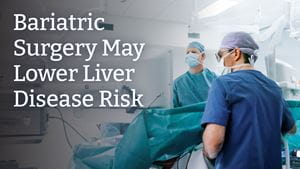
An estimated 256,000 people undergo bariatric procedures each year in the United States, according to the American Society for Metabolic and Bariatric Surgery. The vast majority of those surgeries are for weight loss, but researchers with the Bariatric and Metabolic Institute at the Cleveland Clinic in Ohio wanted to see if there were other effects.
Patricia Hughes, DO, is a bariatrics surgeon with Rochester Regional Health who has years of experience. She explains the results of the study and how bariatric surgery can help people in more areas beyond weight loss.
A study published Thursday in the Journal of the American Medicine Association (JAMA) found that the majority of bariatric surgery patients who had non-alcohol related fatty liver disease were 87 percent less likely to have major liver health issues in the 10 years following the surgery compared to patients who did not have the surgery.
The study retrospectively reviewed 1,158 patients who were diagnosed with fatty liver disease – also referred to as nonalcoholic steatohepatitis (NASH).
Of the patients reviewed in the study, 650 underwent bariatric surgery – specifically for a Roux-en-Y gastric bypass or a sleeve gastrectomy – and 508 received non-surgical treatment.
Researchers reviewed the selected patient’s charts over a decade to examine their overall health and liver function over that time period.
Only five of the 650 bariatric surgical patients experienced “major adverse liver outcomes”, which include advanced liver disease, liver cancer, liver transplant, or death. Forty of the 508 non-surgical patients experienced similar major adverse liver outcomes.
Major adverse cardiovascular events (MACE) were also less frequently observed for bariatric surgery patients as compared to non-surgical patients. These events include unstable angina, heart attacks, stroke, heart failure, or cardiovascular-related death. Thirty nine of the 650 bariatric surgery patients experienced MACE; 60 patients in the non-surgical group experience MACE, as well.
“We have known for years that bariatric surgeries such as the Roux-en-Y gastric bypass and sleeve gastrectomy have excellent health benefits for many of our patients,” Dr. Hughes said. “This study builds on that knowledge and provides patients with tangible data that their health will improve after going through this procedure – along with an overall healthier lifestyle.”
More than one third of Americans are overweight; experts estimate that number will grow to more than half of the U.S. population by 2030.
Taking the time to make a carefully considered decision about bariatric surgery can impact a person’s life in more ways than just reducing their overall weight.
As reflected in the recent study, patients who undergo bariatric surgery are likely to have significantly lower risk of advanced liver disease and lower risk of significant cardiovascular events such as heart attacks or heart failure.
Beyond these effects, bariatric surgery also reduces the risks of other conditions, including:
“Our bariatric surgery team at Rochester Regional Health wants to help you live a healthier life,” Dr. Hughes said. “Coming in to consult with one of our providers is the first step toward creating a healthier you.”